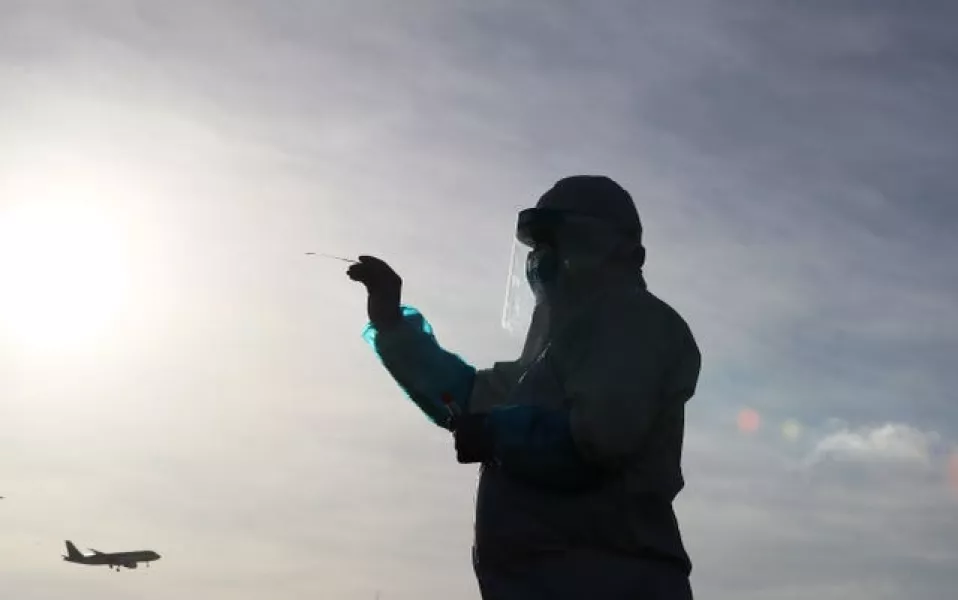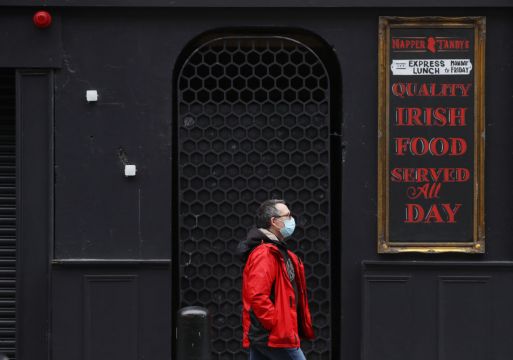The Government has confirmed Ireland will impose a 48-hour travel ban on flights from Britain starting at midnight tonight.
Ferry connections with Britain will be for cargo only with people ordered not to travel unless they are "essential supply chain workers".
A statement this evening said: "Arrangements are being put in place to facilitate the repatriation of Irish residents on short trips to Great Britain and planning to return in the coming days, as well as international travellers to Ireland who are transiting through Great Britain."
The Government added "close coordination" with the Northern Ireland authorities is planned and the measures will be reviewed during Tuesday’s Cabinet meeting.
It follows the decision of a number of European countries to impose bans on flights from the UK over fears the new more-transmissible variant of coronavirus in England could spread.
Industry reaction
In response to the announcement, Aer Lingus is suspending all scheduled flights from Britain, but Ryanair has not cancelled everything.
Ryanair says it will carry passengers on business, while Aer Lingus will operate some repatriation flights.
Both are offering to reschedule passengers for free or give full refunds.
Meanwhile, ferry company Stena Line says it needs clarity around the travel ban as hundreds of people due to cross the Irish Sea on overnight ferries.
They say nearly 200 passengers are due to travel on its 2am sailing from Holyhead to Dublin tonight while 80 would have set off from Fishguard to Rosslare shortly before midnight.
The company's spokesperson says they are seeking clarity on "people undertaking emergency travel and the measures for repatriation".
70% more transmissible
Scientists have warned the new variant could be up to 70 per cent more transmissible than the original virus.
UK prime minister Boris Johnson announced sweeping restrictions in London and the south east of England in a bid to get the disease under control.
Speaking on The Week on RTÉ Radio One, Minister for Health Stephen Donnelly said the Irish Government would not “seal the border” between Northern Ireland and the Republic but strong advice would be issued.
Fianna Fáil TD Jim O’Callaghan also said that the Government will consider further advice from the National Public Health Emergency Team (Nphet) when it meets on Tuesday.
Mr O’Callaghan criticised the lack of action taken by the UK government: “We need to recognise that this country is in a much better position than the United Kingdom.
“If you look at what happened in the UK yesterday, it is very unacceptable that a government would announce on 4pm on a Saturday before Christmas that people can’t travel before 12pm that evening.
“The reason for that is because decisions were not made earlier enough by the prime minister.
“We’ve done a good job in this country.
“We need to look at other statistics in terms of numbers, they have gone up but we always knew they were going to go up.”

He said the rate at which cases are rising is of concern.
“We need to take into account that we are in a good position here but I think that we recognise that household visits seems to be the driver of this,” he added.
“The statistics from the HSE show the danger is in household visits and I suspect that Government will revisit that in terms of limiting the number of people that can visit households.”
Sinn Féin’s Lynn Boylan said: “Instead of a flight ban we need to fix what we haven’t actually done in the pandemic which is monitoring people coming in to the country and having proper contact tracing and testing as opposed to what it is.
“I think we need to have a system where people are going to restrict their movements and they are followed up.
“It is a huge concern about people coming home from Britain over Christmas and if they are carrying that strain.
“I find it more concerning that we’ve had nearly a year now and never actually cracked that nut of tracking the people coming in and leaving the country.”
Cases rising quickly. We have low cases and deaths compared to EU/UK/US. This is at risk now- just as vaccines arrive. To protect yourself & those you love: Stay home. Don’t meet up. Stay away from restaurants/pubs. Avoid crowds. Use masks. Follow health advice. @roinnslainte
— Dr Tony Holohan (@DrTonyHolohan) December 20, 2020
Chief Medical Officer Dr Tony Holohan has also urged people to stay at home and avoid restaurants as cases of coronavirus rise across the country.
He said people should not meet up and warned against being in crowds.
It is the latest warning from the chief medical officer who said there is strong reason for “persistent, ongoing concern” over Ireland’s recent Covid-19 figures.
He tweeted on Sunday morning: “Cases rising quickly. We have low cases and deaths compared to EU/UK/US. This is at risk now – just as vaccines arrive.
“To protect yourself and those you love: Stay home. Don’t meet up. Stay away from restaurants/pubs. Avoid crowds. Use masks. Follow health advice.”
Today the Department of Health confirmed four more people died of the virus, bringing the total death toll to 2,158.
The Department also reported 764 new cases of the virus.
Dr Holohan also said it is not too late to change Christmas plans and cut down on the number of contacts.
The national 14-day incidence rate per 100,000 population now stands at 112.2.
This comes as Covid-19 restrictions were relaxed here on Friday, allowing inter-county travel over Christmas until January 6th and permitting three households to meet indoors.
But tougher restrictions are set to be imposed before the new year.
Taoiseach Micheál Martin confirmed on Friday that pubs and restaurants will be closed before New Year’s Eve.
He said he would recommend to Cabinet that gastropubs and restaurants now close early.
Public health bosses have recommended stricter measures to Government, including that pubs and restaurants be closed before the new year and greater restrictions be placed on household visits after Christmas.
It comes after Nphet warned that cases of Covid-19 are accelerating faster than anticipated after restrictions were eased at the beginning of December.







